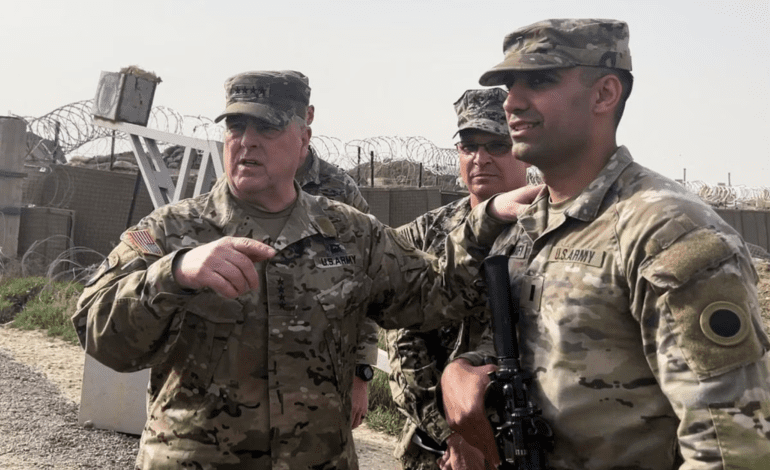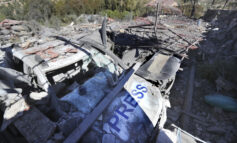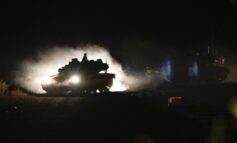Syria’s foreign ministry has condemned a surprise visit by the United States’ top military officer to an army base in the Kurdish-held northeast, dubbing it “illegal,” state media reported.
In his snap visit last Saturday, Joint Chiefs of Staff Chairman General Mark Milley met U.S. troops stationed in areas of war-torn Syria under the control of the Kurdish-led Syrian Democratic Forces (SDF).
About 900 U.S. soldiers are deployed in several bases and posts across northeastern Syria as part of the fight against ISIL (ISIS) group remnants.
“Syria strongly condemns the illegal visit of the American chairman of the chiefs of staff to an illegal American military base in northeast Syria,” the official news agency SANA quoted a foreign ministry official as saying on Sunday.
Milley’s visit was “a flagrant violation of the sovereignty and integrity” of Syrian territory, the official added, according to SANA, calling on “the U..S administration to immediately cease its systematic and continued violation of international law and support for separatist armed groups.”
President Bashar al-Assad’s government views the deployment of U.S. forces in SDF-held territory as “occupation” and accuses U.S.-aligned Kurdish forces of “separatist tendencies.”
Kurdish officials deny any separatist aspirations and say they seek to preserve their self-rule, which Damascus does not recognize.
Milley’s spokesman, Dave Butler, told the AFP news agency the U.S. general “visited northeast Syria on Saturday… to meet with commanders and troops.”
It was Milley’s first trip to Syria since assuming the chairmanship in 2019. He visited the country before as an army chief, the spokesman said.
During the visit, Milley “received updates on the counter-ISIS mission,” Butler added.
The general also “inspected force protection measures and asserted repatriation efforts for the al-Hol refugee camp”, home to more than 50,000 people, including family members of suspected foreign ISIL fighters whose home countries have not taken them back.
The U.S.-led coalition battling ISIL provides support for the SDF, spearheaded by the Syrian Kurdish People’s Protection Units (YPG).
American officials say that ISIS could still regenerate into a major threat.
But the mission, which former President Trump nearly ended in 2018 before softening his withdrawal plans, is remnant of the larger global war against terrorism that had once included the war in Afghanistan and a far larger U.S. military deployment to Iraq.
Asked by reporters traveling with him if he believed the deployment of roughly 900 U.S. troops to Syria was worth the risk, Milley tied the mission to the security of the United States and its allies, saying, “If you think that that’s important, then the answer is ‘Yes.’
“I happen to think that’s important,” Milley said.
“So I think that an enduring defeat of ISIS and continuing to support our friends and allies in the region… I think those are important tasks that can be done.”
The mission carries risk. Four U.S. troops were wounded during a helicopter raid last month when an ISIS leader triggered an explosion.
Last month, the U.S. military shot down an Iranian-made drone in Syria that was attempting to conduct reconnaissance on a patrol base in northeastern Syria.
Three drones targeted a U.S. base in January in Syria’s Al-Tanf region. The U.S. military said two of the drones were shot down while the remaining drone hit the compound, injuring two members of the Syrian Free Army forces.
U.S. officials believe drone and rocket attacks are being directed by Iran-backed militia, a reminder of the complex geopolitics of Syria where Syrian President Bashar al-Assad counts on support from Iran and Russia and sees U.S. troops as occupiers.
U.S. Army Major General Matthew McFarlane, who commands the U.S.-led coalition against ISIS in Iraq and Syria, described attacks against U.S. forces as a “distraction from our main mission.”
Lieutenant Kamal Alsawafy from the Michigan National Guard is one of the U.S. soldiers in Syria helping provide security for Iraqis leaving al-Hol to be repatriated back to Iraq in protected convoys.
The son of Iraqi refugees who emigrated to the United States, Alsawafy said helping Iraqi refugees brings him joy and described watching people at al-Hol cheering as Iraqis departed the camps for better lives back in Iraq.
“It’s a good feeling,” Alsawafy said.
Alsawafy, is an elected City Councilman in Dearborn, Michigan, home for the largest single concentration of Arab community in the U.S., including Iraqis.






Leave a Reply